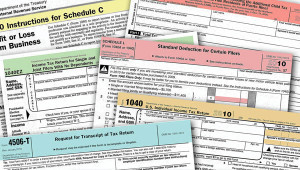

If you try to claim illegitimate write-offs, you could end up getting audited and owing more taxes, as well as penalties and interest. To help you avoid that, we’ve put together a list of expenses you might be tempted to claim but can’t. We’ve also provided related tax breaks that do pass muster with the IRS and will lower your tax bill.
For example, you can’t deduct expenses for the family dog, but you can deduct as itemized medical expenses the costs of buying, training and maintaining a guide dog or other service animal to assist a person with a physical disability.
Here are nine expenses you can’t deduct, along with nine related expenses that are deductible for the 2018 tax year.
1. Home insurance (unless it’s mortgage insurance)

If you meet certain IRS guidelines, however, you can deduct private mortgage insurance, or PMI, on your 2018 tax return. PMI is insurance your mortgage lender requires you to buy if you pay down less than 20 percent. The PMI payment is tacked on to your mortgage payment. Until you get at least 20 percent equity, you have to pay PMI.
The premiums are deductible as an itemized expense, on Schedule A with your mortgage interest claim, as long as the mortgage insurance policy was issued in 2007 or later and is for your primary home or a second home that you are not renting out. Your adjusted gross income, or AGI, will determine whether you can deduct all, part or none of your PMI premiums.
2. Landlines and cellphones (unless business-related)

If you still have a landline telephone at home, you can’t deduct the cost, even if you primarily use that phone for business. The IRS says the first hard-wired phone line in your home is considered a nondeductible personal expense.
But you can deduct as a business expense the cost of business-related long-distance charges on that phone. And if you have a second landline phone specifically for business, its full cost is deductible.
Cellphones are a legitimate, deductible expense if you’re self-employed and use the phone for business. It’s recommended you get an itemized bill, though, to prove it.
However, the “unreimbursed business expense” deduction for using a personal cellphone for work has been eliminated. And if your employer provides you with a cellphone as part of your job, this could increase your taxable income.
3. Commuting costs (unless it’s for a temporary job)

But you might be able to deduct some commuting costs if you work at two places in one day, whether or not for the same employer. In this case, you can deduct the expense of getting from one workplace to the other.
You also can deduct transport expenses between your home and a temporary job that is expected to last one year or less.
And if your home is your main workplace, you can deduct transportation expenses for going from your home to another work location in the same trade or business.
4. Social Security taxes (unless you overpay)

But if you overpaid the tax, you can get a credit for FICA over-withholding. There is a limit on how much FICA taxes can be contributed each year. For 2018, the most you have to pay in Social Security taxes is $7,960.80. Not many taxpayers earn enough to pay the maximum.
If you had more than one job and your combined earnings exceed the wage cap, you probably had too much FICA taxes withheld.
In 2017, up to $127,200 in earnings was taxable. For 2018, the earnings cap rises to $128,400.
5. Plastic surgery (unless medically necessary)

But if, for instance, you have a nose job to treat respiratory problems, the doctor’s decision makes it a medical deduction.
The IRS says you can deduct the cost of plastic surgery if it is necessary to improve or correct a deformity resulting from a congenital abnormality, an injury incurred in an accident, trauma or a disfiguring disease.
6. Cost of work wardrobe (unless it’s a uniform)

But you can deduct the cost of dry cleaning or laundry of business uniforms, which, under the tax code, is attire you can’t wear anywhere else other than work.
Also deductible are cleaning charges for nonprofit uniforms, such as an outfit required of hospital volunteers, or Boy Scout or Girl Scout troop leaders. Here, the costs of the uniform and its maintenance would count as charitable deductions.
7. Volunteer work (unless you rack up mileage)

You can’t claim the monetary value of the hours you spent volunteering at your favorite nonprofit. Neither can you deduct the value of a project you created for the charity, such as a poster.
But you can deduct other costs associated with your charity work. This includes the miles you drive doing the charity’s work, which can be claimed at the rate of 14 cents per mile. Keep good records on your charity travel mileage.
You also can claim as a charitable deduction unreimbursed out-of-pocket expenses. Hang on to the receipts for the poster board and special markers you bought just for the nonprofit’s poster project.
It makes sense to have a credit card exclusively for use in your volunteer activities.
8. Over-the-counter medicines (unless a doctor prescribes)

That option ended in 2011. Now, you must get a doctor’s prescription for over-the-counter meds before the purchase can be reimbursed with FSA funds.
But you still can deduct diagnostic tests, such as store-bought tests for pregnancy and blood-sugar levels. And the IRS says moms get a tax deduction on breast-feeding supplies, including pumps and bottles.
9. Summer camp for the kids (unless it’s day camp)

Some families send the kids off to camp. That’s a great experience for the kids and eases child-care concerns for a time.
But sleep-away camps are not tax-deductible.
However, if you decide instead to keep the kids at home and send them to day camp during the hours you’re working or looking for a job, that expense could qualify for the child- and dependent-care credit.
For one child, you can count up to $3,000 of care expenses toward the credit for 2018. If you paid for the care of two or more dependents, the credit limit is $6,000.
Your actual tax credit can be up to 35 percent of your qualifying expenses, depending on your income. Since it’s a credit, you get to use it to offset your tax bill, dollar for dollar.
If you’re getting a tax refund, consider where you should park it. Check out CD rates at Bankrate.












